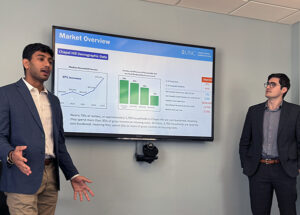News & Stories
Students collaborate on affordable housing project

“It’s all about partnership.”
That’s what Bruce Warrington (MBA ’08), executive director of real estate operations at UNC-Chapel Hill, says about the collaboration between his team and students in Professor Eric Maribojoc’s Affordable Housing Practicum class at UNC Kenan-Flagler Business School.
In this experiential learning class, teams of students work as consultants for affordable housing organizations or developers. In spring semester 2024, a group of students teamed to tackle a project on the University’s radar: how to transform a property owned by the University into affordable housing.
The University’s endowment owns a 1.75-acre parcel managed by UNC’s real estate operations about a mile north of campus, which is in an Opportunity Zone along a bus rapid transit route planned for 2028. Two office buildings in sub-optimal condition, currently underutilized by the University, sit on the site. Warrington says that the space is clearly better for multi-family housing than for offices, given its location near downtown and on the bus line.
Five UNC Kenan-Flagler students – two undergraduate and three MBA students – were charged with providing two recommendations to create affordable housing for graduate students and the general community, including details such as the number of units to be developed, the size of the units, the developer’s fee, land value and pricing. The student team gave a detailed presentation to University clients in March, sharing their analyses, research and comparisons, as well as the three development options they researched.
UNC Kenan-Flagler students presented their recommendation for a site development plan for the University to partner with a developer to build microunit housing, studio apartments that are generally less than 500 square feet. The students believe the University’s parcel can support up to 150 microunits at rents affordable to those earning 80% of area median income for Chapel Hill/Orange County. The group noted that the microunit concept aligns with the University’s affordability mission by providing many affordable housing units with reasonably attractive financial returns. Students recommended that a 50-year ground lease between UNC and a microunit multifamily developer would enable the University to delegate the development and operational responsibilities to a third party while still generating income from the site.

Maribojoc, associate director of the Wood Center for Real Estate Studies and the lead of its housing affordability initiative, says that providing his students with real-world projects enriches their educational experience.
“We have a tagline for our program: ‘real-world real estate,’” he says. “Having them work on affordable housing development, which is far more challenging than market rate development, is a good experience for students. And working with the University is very valuable since they can contribute to how their university will use its own resources.”
Maribojoc adds that having his students explore an issue that impacts people working for the University, as well as students grappling with finding affordable places to live as close as possible to campus, is a bonus.
Aidan McConnell (MBA ’24) agrees. “I love the concept of potentially being able to contribute to fixing the housing affordability problem,” he says. “Getting the opportunity to learn the nuances of what can and can’t work and understanding the true barriers to delivering on this affordability mission has been a good learning experience. I’m excited that the University is giving a lot of trust to its students and sees graduate and undergraduate students as critical components of these conversations.”
Yash Patel (BSBA ’25) says that the class has impacted his career choice. While he was not previously knowledgeable about affordable housing, he now hopes to work in the field at some point in his career. He is grateful for the hands-on experience he received, particularly as an undergraduate. “The main benefit is that I get to have an impact because this proposal could become reality,” says Patel. “If I come back in 10 or 15 years and see housing on this land, I can say that I did my part in helping UNC employees and graduate students have a place to live closer to campus.”
Warrington was impressed with the students’ work, calling it thorough and creative.
“Partnering with the business school is such a win-win for these types of projects,” says Warrington. “We get the benefit of their energy, fresh ideas and legwork, and I hope that they are seeing the benefit of contributing to a real-world real estate development opportunity. Getting this first proposal is a big help for us to then explore next steps and adjust as we move forward to make the project work for our many different stakeholders.”